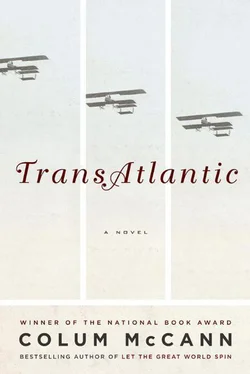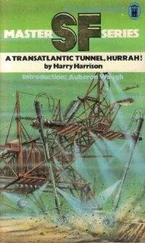In 1904 Driscoll was found slumped over at his desk. A massive heart attack. His third in a row. She thought of him shuddering in his tight white waistcoat. The funeral was held in the bright St. Louis sunshine. She arrived in a wide black hat and long gloves. At the back of the mourners, she held Lottie’s hand. Later that week she was called into the newspaper offices. Her heart hammering with expectation. She would now be given her full name, her byline, her right. She had bided her time. She was thirty-one years old. This was her chance. So many stories. The World’s Fair had made the city shimmer. The skyline was stepping upwards. So many accents on the streets. She would capture it all. She walked the stairs. The newspaper owners sat with hands folded, waiting. One of them absently probed the stem of his spectacles at his earlobe. He grimaced as she sat. She began to speak, but they cut her off. Driscoll had left a letter for them in his desk drawer. She could feel her lip tremble. The letter was read out. He had, he claimed, written her articles all along. Word for word. Every small swerve. It was his parting gift. His face slap.
She was stunned by the industry of his revenge. She would never, said the owners, be allowed to work again. She tried to summon a word. They closed the folders in front of them. One stood up to open the door for her. He looked at her as if she were nothing more than a passing horse.
She walked along the river, her face hidden underneath her wide hat. Her mother had walked along here, too, years before. Lily Duggan. Water carried on water. Emily went home to the apartment on Cherokee. She threw her hat away, packed a bag with their things, left the typewriter behind. They moved out from St. Louis to Toronto, where her brother, Tomas, a mining engineer, lived. A room for two months. His wife balked. She did not want an unwed mother around. Emily and Lottie took a train to Newfoundland: the sea did not ice.
They rented a room on the fourth floor of the Cochrane Hotel. Two days later she knocked on the door of the Evening Telegram . The first article she wrote was a portrait of Mary Forward, the owner of the Cochrane. Mary Forward walked around under her storm of gray hair. Her bracelets slipped down her forearms as she lifted the hair from her neck. The hotel itself was captured in quick sharp strokes. The newlyweds — farmboys and farmgirls, their fingers thick and nervous — sitting in the breakfast room. The piano that sounded out at all hours. The banisters that curved into a question mark. Mary Forward liked the article so much that she framed the page in the doorway of the bar. Emily wrote another. About a schooner caught on the rocks. Another about a harbor master who had never been out at sea. She was allowed to use her full byline. She slid into the skin of the town. She felt comfortable there. The fishing boats. The small bells sounding over the water. The threat of storm. She caught the palette of color along the quays. Reds, ochers, yellows. The constant search for the better word. The silences, the blasphemies, the quarrels. The locals were wary of newcomers, but Emily had the texture of old weather and she dissolved amongst them. Lottie, too.
Over the years Emily published poetry with a press in Halifax. The books fell away, but that hardly mattered to her anymore; they had existed for a while, found themselves a shelf to rest upon. So, too, with the weekly columns: she might not have been party to love, but it still took a lot of volume to fill a life.
IN THE MORNING Emily swung her feet from the bed. Lottie was still sleeping. A piece of hair had fallen across her face. It rose and fell gently with her breath. A vague scent of gin in the room.
Emily rolled her tights up onto her ankles and struggled into her shoes. She reached for her cane, bent across Lottie, kissed the warm of her forehead. Her daughter stirred, didn’t wake.
The corridor was quiet. She walked along its whiteness. She stopped and leaned against the wall to get her breath back. She could not lay her hands on the emptiness of what she felt. The boat pitched and moaned. She thought to herself that she was, perhaps, skirmishing her way around a headache.
She was helped up the stairs by a young steward. The fresh air calmed her a moment. The gray of the water stretched endlessly. It fell into shapes like a child’s painting.
The boat hit some choppy water. A loud whistle cut the air. The umbrellas were folded and put away. The deckchairs skillfully stacked.
Somehow a maplewood guitar had been left on the upper deck. A stain of rain on its dark neck. She picked it up and shuffled back to the stairs. She wanted to return it to its owner. A sharp, warm pain moved across her forehead. She was at the point of exhaustion. Her cane dropped and skittered down the stairs. She grabbed the handhold. Slowly eased herself down. She was careful not to clang the guitar against the stairs as the boat rolled.
A reek of vomit came from the corridor. A garbled message shot over the loudspeaker. The last thing she could recall was the falling clang of the guitar as another wave hit.
EMILY WOKE WITH the ship’s doctor leaning over her. He held a stethoscope to her chest. Took her pulse. He wore a reflecting mirror on his forehead. When he backed away to look at her, she could see the shimmy of her form in the round mirror. She struggled to sit up and speak. There was a quality of gauze to the world.
Lottie hovered in the background, chewing her nails. Her tall frame, her pale blue eyes, her short bobbed hair.
The doctor ran his hands along the length of Emily’s arm, checking for swelling at her neck. A stroke, she thought. She mumbled something. The doctor soothed her, put a hand on her shoulder. He wore a wedding ring on his left hand.
— You’ll be all right, Mrs. Ehrlich.
She felt her body tighten. She saw Lottie lean across and mention something to the doctor. He shrugged, said nothing, unhinged the stethoscope from around his neck. He turned to the row of cupboards behind his head, reached for a bottle of pills, counted some out in a silver dish, scooped them into a small glass jar.
SHE REMAINED IN the sick bay for three days. A severe dehydration, he said. A possible strain on her heart. She would have to go for tests when they arrived in Southampton. Lottie stayed beside her, morning to night.
A damp cloth was placed on her forehead. She wondered if a part of her had fallen ill precisely because she wanted to dwell for a while longer in the presence of her daughter. The desire not to lose her. To keep her nearby. To live inside that alternative skin.
A DAY FROM England, she was brought up on deck. A little haze of brown in the mist. An indistinct form of dark. Lottie told her that it was the coastline of Ireland. The headlands of Cork disappeared behind them — at the rear of the boat the phosphorescence shone.
IN SOUTHAMPTON SHE gave the porter a few shillings to carry their trunk off quickly. She would not go to the hospital. They had already made arrangements for a driver to bring them to Swansea. She couldn’t change anything now.
She saw Lottie, on the gangplank, shaking hands with the ship’s doctor. So that was it. That was all. She felt a vague sadness.
She took Lottie’s arm as they walked down the gangplank together. Her legs felt hollow beneath her. She stopped a moment to gather her breath, adjusted her hat and they walked down to a line of drivers who were waiting on the quayside. An old Ford. A Rover. An Austin.
A portly young man with a clean-shaven face stepped forward. He extended a soft hand and introduced himself. Ambrose Tuttle. He wore the blue of an RAF uniform, a pale blue shirt, trousers that accordioned at his ankles. His head came to Lottie’s shoulder. He glanced up at her as if she were walking on stilts.
Читать дальше












